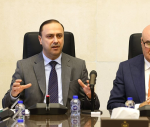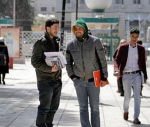You are here
Sudan rebels insist new parliament be formed only after peace deal
By AFP - Nov 07,2019 - Last updated at Nov 07,2019
KHARTOUM — Sudanese rebel groups engaged in peace talks with Khartoum insisted on Wednesday that the country’s new parliament be formed only after an agreement is reached to end long-running conflicts in three border regions.
A power-sharing deal signed on August 17 between protest leaders and the generals who ruled Sudan after the April overthrow of longtime president Omar Al Bashir stipulates that a 300-member parliament be formed within three months.
Since the signing of the so called “Constitutional Declaration”, the transitional government, led by Prime Minister Abdalla Hamdok, has engaged in talks with three rebel groups to reach a peace deal to end the wars in Darfur, Blue Nile and South Kordofan.
Rebel groups said that during talks in the South Sudanese capital of Juba, the two sides had agreed to delay the formation of a new parliament until a peace deal has been reached.
The groups said they would not give up their demand despite the protest movement’s insistence on the original November 17 deadline stipulated by the so-called “Constitutional Declaration”.
“The Sudanese Revolutionary Front [SRF] rejects any unilateral attempt to violate the Juba declaration that aims to build confidence measures,” the rebel alliance said in a statement.
The SRF called on Khartoum to “stick to what has been agreed on” in Juba.
It urged Khartoum not to set off any “upheaval that might disturb the atmosphere and create a state of mistrust that will delay the reaching of peace, which our country is in desperate need of”.
Hamdok’s government has made reaching a peace deal to end conflict in the country’s three war zones a priority.
Hundreds of thousands of people have been killed and millions displaced in the rebellions by ethnic minority groups in the three conflict zones that met with an iron fist from Bashir’s ousted regime.
Time not enough’
Bashir himself is wanted by the Hague-based International Criminal Court for genocide, war crimes and crimes against humanity for his alleged role in the war in Darfur. He denies the charges.
Veteran Sudanese journalist Khalid Tijani said the forming of parliament by November 17 was now difficult.
“The time left is not enough as there is still no agreement on the mechanism of appointing the lawmakers within the protest movement itself,” Tijani told AFP.
“The military too is of the opinion that forming a parliament at this stage might lead to more complications as these lawmakers would be appointed and not elected.”
Tijani said the near-term developments in Sudan are expected to be influenced by what happens with the peace negotiations.
“If a peace deal is reached, it will lead to restructuring of the government and possibly even the sovereign council,” he said, referring to the 11-member ruling body that is currently governing the northeast African country.
“And if peace is not achieved, then it will affect the entire transitional period.”
Protest leader Satea al-Haj acknowledged that there were “obstacles” in forming of parliament before November 17.
Related Articles
KHARTOUM — Sudan's main rebel alliance has agreed a peace deal with the government aimed at ending 17 years of conflict, official news agenc
JUBA — The Sudanese government and nine rebel groups on Saturday signed an agreement on a roadmap towards ending the bloody conflict in
JUBA — Sudan's government and rebel groups on Saturday inked a landmark peace deal aimed at ending decades of war in which hundreds of















